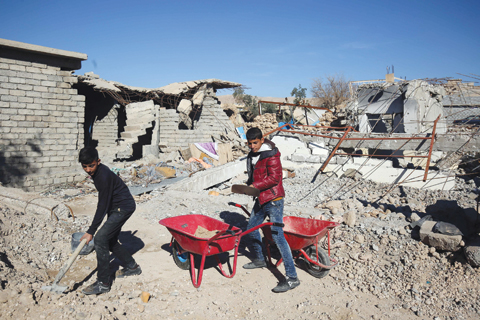Places of worship targeted, destroyed by Islamic State - There are now only 400,000 Iraq Christians
 QARYAT BAZKARTAN: Iraqi boys, from the Shabak community, clear the rubble around their house which was destroyed by Islamic State (IS) group jihadists in the village of Baz Gerkan, east of Mosul. —AFP
QARYAT BAZKARTAN: Iraqi boys, from the Shabak community, clear the rubble around their house which was destroyed by Islamic State (IS) group jihadists in the village of Baz Gerkan, east of Mosul. —AFP
BARTALLA: A Christmas tree stands on a roundabout in Bartalla in northern Iraq, its base adorned by posters of Shabak martyrs killed in the fight against the Islamic State group. Now that victory has been declared against the jihadists, Iraq's ethnic and religious minorities are taking the future into their own hands. In Baz Gerkan village, where fighting damaged or destroyed most of the houses, Shabak residents have rebuilt their school themselves.
A few kilometers away, they have restored the shrine of Imam Rida, the eighth of Shiite Islam's 12 imams, which was blown up by the Sunni Muslim jihadists who consider Shiites to be heretics. Shabaks, who number around 60,000 in Iraq, have their own language and say they first settled in the Arab country several centuries ago from northern Iran. Their places of worship, such as those of Christians, Yazidis and other minorities, were targeted by IS, and many fled their homes during the three years of jihadist occupation.
There are now only 400,000 Christians in Iraq against more than one million before the US-led invasion of 2003, making up three percent of the country's population along with Yazidis, Sabeans and Shabaks. Today, several months after the entire northern province of Nineveh was retaken from the jihadists, churches and monasteries have been restored. And for the first time in four years last December, Christmas carols were heard.
Yazidis rebuild their temples
The Kurdish-speaking Yazidi minority has also managed to rebuild 20 of 23 temples destroyed by the jihadists in the Bashiqa area, east of Iraq's second city Mosul. "All this was done thanks to donations from Yazidis and other inhabitants of the region," said Hilal Ali, who is in charge of the Yazidi sites of worship. Mutassem Abed, 47, is a Shiite who joined the Hashed Al-Shaabi coalition of paramilitary units following a call to arms in 2004 by Grand Ayatollah Ali Sistani, Iraq's most senior Shiite cleric. The Hashed was formed specifically to counter the rise of IS in the country, and played a key role in the jihadists' defeat in 2017.
Now that the fighting has ended, Abed is looking to his future. "We must rebuild a sanctuary that is even more beautiful and even bigger, to say to IS that it did not win," the Shabak fighter said, wearing a parka over his uniform. Life may slowly be returning to normal, but many checkpoints have been set up, usually manned by members of Hashed units from the Shabak, Turkmen, Christian or Yazidi minorities. Iraq is relying on local forces to maintain security on the ground, after declaring in December that the war against IS had been won. Such fighters know the local people, speak their languages and can easily spot any intruders, commanders say.
Fighters with local knowledge
"Even before IS, other terrorist groups like Al-Qaeda tried to chase out minorities," said Zein Al-Abidine Jamil, a Shabak commander with the Hashed. Another Bartalla Shabak, a policeman manning a checkpoint in the old part of Mosul, recalled the days when he could only enter the city under escort. "Mosul? I went there on patrol. But never in a personal capacity. A lone Shiite? That would have been madness!" he said, speaking on condition of anonymity.
Sunni Muslims are a minority in Iraq, but in Mosul they form the majority and also have a presence in villages around the city. The Shabak minority has a small Sunni community within it. But, residents say, many of them joined IS and were killed. Others fled with their families, joining the ranks of the displaced. Today, several months after Nineveh province was rid of IS, "we are directly responsible for the security of citizens", said Jamil.
Because of their local knowledge, such fighters were a major asset to the armed forces in their fightback against IS. But human rights groups have charged that some minorities targeted by the jihadists were themselves guilty of abuses. In December, the New York-based Human Rights Watch accused Yazidi fighters of executing 52 civilians in apparent revenge killings after capturing territory from the jihadists. HRW said those killed included women and children, and came from eight families of the Sunni tribe Al-Bu Metewut who were fleeing clashes between IS and pro-government militias north of Mosul._ AFP




